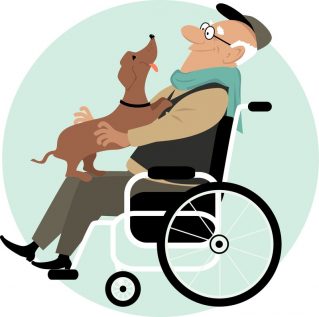Service Dog

Service animals are defined as dogs that are individually trained to do work or perform tasks for people with disabilities. Examples of such work or tasks include guiding people who are blind, alerting people who are deaf, pulling a wheelchair, alerting and protecting a person who is having a seizure, reminding a person with mental illness to take prescribed medications, calming a person with Post Traumatic Stress Disorder (PTSD) during an anxiety attack, or performing other duties. Service animals are working animals, not pets. The work or task a dog has been trained to provide must be directly related to the person’s disability. Dogs whose sole function is to provide comfort or emotional support do not qualify as service animals under the ADA.
- Service animals/service dogs have full public access
- Service dog in training in most states have same full access (check your state laws)
- Are specifically trained to help mitigate a handlers disability
- Service animals are not pets- they are working dogs
- There is no certification required (we hope that will change soon)
- No vest or tag is required to prove it’s a service animal
- The best indication that it is in fact a service animal is to watch the communication between the dog and the handler
- Service dogs must be on leash and under the handlers control at all times with very limited exemption if the disability of the handler is such that a leash is not possible (for example if a handler is missing arm limbs) .
Emotional Support Animal (ESA)

An emotional support animal (ESA), assistance animal, or support animal, is a companion animal that a medical professional says provides some benefit for a person who might have a mental health condition or emotional disorder. An emotional support animal differs from a service animal. Service animals are trained to perform specific tasks, while emotional support animals receive no specific training. (It therefore stands that in the setting of mental illness, whether or not the animal is a “service animal” vs. an emotional support animal would hinge on whether the dog is formally trained to do something specific to mitigate the mental illness.) Any animal that provides support, well-being, comfort, or aid, to an individual through companionship, non-judgmental positive regard, and affection may be regarded as an emotional support animal.
- The Fair Housing Amendment Act (FHAA) stipulates that ESAs are permitted in no-pet housing.
- Air Carrier Access Act In some cases, and this is changing and evolving, ESAs are permitted to fly in-cabin with specified documentation on a U.S. flight; this includes flights within the United States and flights from overseas. Check with your carrier before every flight as this is an every changing situation.
- An ESA can be in a housing situation that may not otherwise allow pets with proper Doctor provided documentation
- An ESA may be able to fly in the cabin with proper Doctor provided documentation pending carrier new laws being put in place- check with your carrier
- Emotional support animals are prohibited from hotels, motels, restaurants, and other business areas, they do not have public access like a Service Dog. In the case of hotels and motels, they are temporary housing so they do not fall under the category of residences described in the Fair Housing Amendment Act.
- If you intend to travel with your ESA, you should contact the hotel manager in advance and inquire whether they are a Pet Friendly establishment. If a hotel is pet friendly- then an ESA would most likely be allowed. You would however still be responsible to pay whatever pet fee the establishment has and your dog would have to follow well behaved rules.
Therapy Dog/Therapy Animal

A therapy dog is a dog that might be trained to provide affection, comfort and love to people in certain settings such as schools, hospitals, senior care centers. These dogs are defined but not covered or protected under the Federal Housing Act or Americans with Disabilities act. They do not have public access rights with exception to the specific places they are visiting and working. Typically the dog would be granted rights by individual facilities only. Therapy dogs are subjected to several tests to ensure that they are fit for the job. These tests look at their ability to block out distractions, comfortable around a variety of people with a variety of disabilities, and are comfortable and able to walk through many different terrains.
- They do Not have Public Access in Hotels, Restaurants, or any public place except where a therapy dog program is in place.
- You can not bring a therapy dog on a flight
- You can not claim a therapy dog is a service dog
- You can not live in a no pet housing situation with a therapy dog.
